International Community Development Profile: Emola Mbata Family in Tanzania
In this series, families in the Reaching Children’s Potential (RCP) Demonstration Program in Tanzania explain how their participation improves their lives. Global Volunteers’ RCP Program engages short-term volunteers to help parents deliver essential services improving health, eradicating hunger, and enhancing cognition – with the goal of eliminating child stunting in the Ukwega Ward and throughout Tanzania. Through RCP, families obtain the nutrition, health care, knowledge, technology, and encouragement needed to combat stunting, and to ensure their children can realize their full potential. The RCP Program is a child-focused, parent-driven, family-centered, and community-led comprehensive effort. It begins with pregnancy, and continues through the 18th birthday, with a focus on the first 1,000 days of life. Read Emola Mbata’s interview about the RCP Program here.
Can you tell us a bit about where you grew up and where you went to school? What is a normal day like for you, Emola?
I was born and raised in Ipalamwa. My education level is only the secondary school education pursued at Ipalamwa Secondary School until 2017. I met Peace’s father when I was in school. I will never move out of Ipalamwa because here I have easy access to farming and other productive activities. This is my home, so if I moved to another place, it would be hard for me to get land and conduct my work activities as I do here in Ipalamwa.
I usually wake up at 6:00 a.m. and prepare breakfast and get ready to go to the field. I usually come back from the field in the evening. I live at my parents’ house with my parents and my siblings. My parents are my great supporters in everything. We always prepare three meals per day but we usually prepare lunch when we are at the field. I mostly spend my time in the field, but if it happens that I don’t go one day, then I just stay at home and do domestic activities. I love sleeping in my free time or playing with my child and sometimes I tell stories with my friends. We get water from a place that is about fifteen minutes away, so it takes about half an hour there and back. I read books when I was still in school, but recently I have not read any books because I do not have access to them.
What can you tell us about your daughter, Peaceneith?
Up to now, she is doing great because the program has been helpful. She’s still so young so it’s hard to know what her interests will be, but I hope she will become very educated, to the level of higher education, and have a great job. I really hope she becomes a nurse and I’m working hard to make sure she meets her dreams. I hope the program will continue to help me train my child to have a brighter future.
What are your family’s biggest challenges? How do you try to address them?
I sometimes face financial difficulties, but the only way to tackle this is to work hard – as much as possible so that my child’s needs are met, and so that she continues to grow in good health. That is the reason why I work hard with all my strength.
What are you most proud of in your family? What do you hope for in the future?
I feel proud to be a responsible mother to my child and when I look at her, I feel so happy and proud as a mother. In some years to come, I’m planning to build my own house so that I can move from my parents’ house.
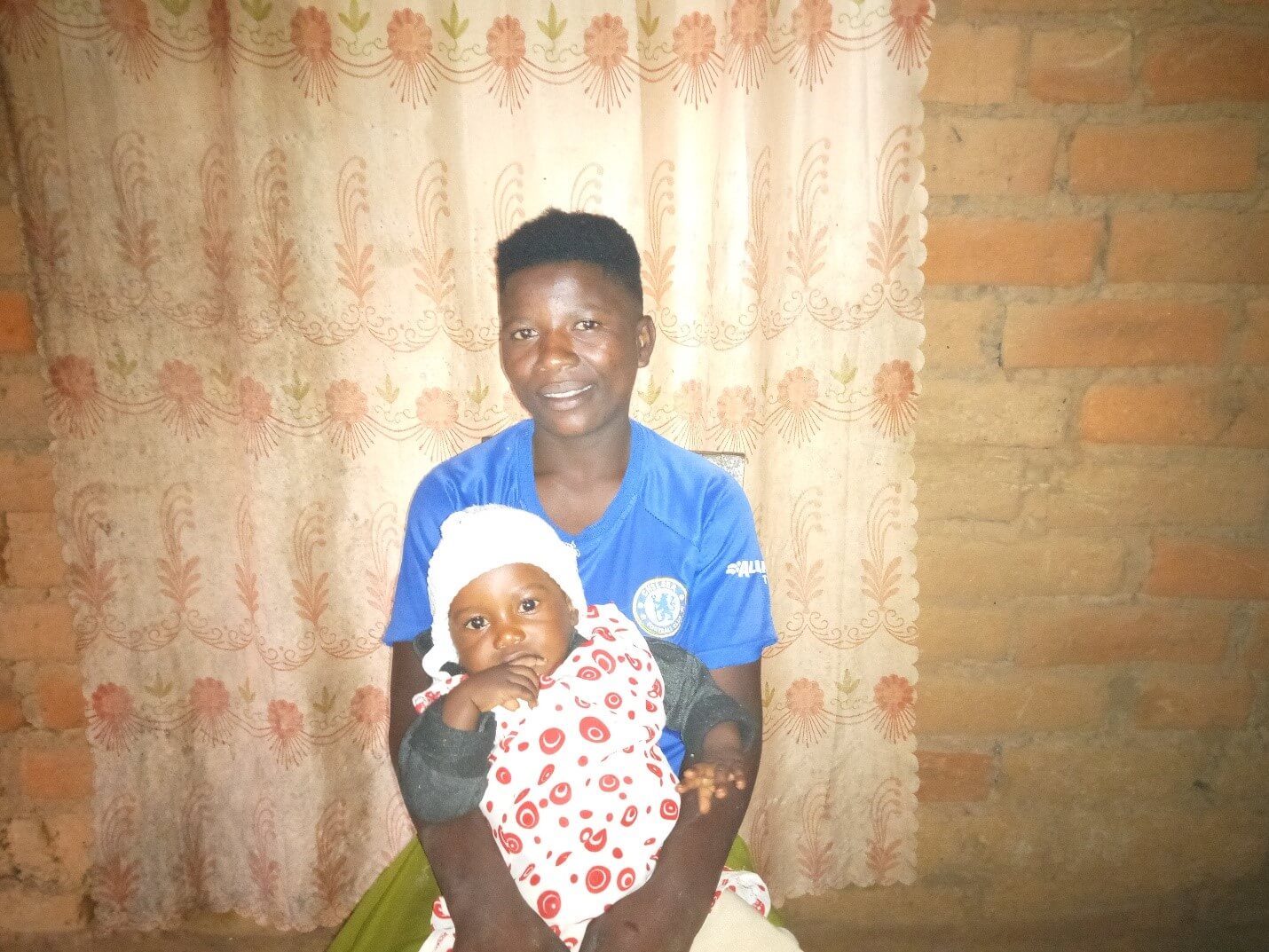
What values from your ancestors and cultures are you trying to maintain?
When I was pregnant, I was told not to stand by the door and to go back inside. If I needed to go outside, I needed to do so directly. It is believed that if you stand by the door when you are pregnant, you will have a difficult delivery. Also, when a girl is in her menstrual cycle, she is not allowed to work on the first day and she has to do light work for the rest of the days. Nor is she allowed to pick vegetables from the garden as it is believed that if she does, all the vegetables in the garden will dry up. But I do not believe this.
What are the personal changes you’ve made in your life since joining RCP that have resulted in better health for you and your children? What are you doing differently now?
I joined the program at the end of last year, and I have already seen great changes for me and my family. Most of us do not get sick like we used to, which was frequent. This is because of the hand-washing education that the caregiver gave me. When I joined the program, my caregiver gave me so much information on the importance of washing hands with soap and water. She insisted my family and me wash our hands frequently and especially at certain times. My family now uses the hand-washing station and they all know the importance of washing their hands regularly. So far, we have seen a difference since we have not been experiencing regular stomach pain as it was before.
I was able to attend a workshop on dental hygiene and that was very helpful to me. I did not know which practices can help dental health, but I learned a lot from that workshop. Also, my caregiver has been doing a very good job visiting me regularly and teaching me a lot of things like nutrition, especially which foods to give to a child, how to cook the meals that we are given, and how to raise a child in general, like stimulation, cognition, and disease prevention. All of these have been very helpful because my child now can understand a few things quicker than I expected. The program has been very helpful. I love everything about the program but especially the meals, garden boxes, and the handwashing station because they are all helpful in building our health.
“The program has been very helpful. I love everything about the program but especially the meals, garden boxes, and the handwashing station because they are all helpful in building our health.”
– Emola Mbata, RCP mom
Have the Rise Against Hunger meals been important to you?
The meals have been great help to us! They have been very helpful to me and my child because I produce enough breast milk to breastfeed my baby. I also feel stronger when I eat the meals. My child gets the meals through my breast milk and has just begun to eat solid foods. We usually eat three meals per day and they include ugali, beans, vegetables, yams, cassava, potatoes, avocados, and bananas. Peaceneith loves porridge, bananas, and avocados. She is growing well and her weight has been increasing each month.
How have your EarthBoxes helped you supplement your family’s nutrition?
I have two garden boxes where I planted Chinese cabbage and cucumbers. They are all doing great and I have already harvested Chinese cabbage five times and it still grows very well. The cucumbers continue to grow and soon I will have the first harvest of them. I haven’t had any challenges at all with the EarthBoxes and I enjoy having them because I do not have to walk far to look for vegetables and it saves me time. I have these vegetables readily available to cook for my whole family, so I really enjoy having the EarthBoxes.
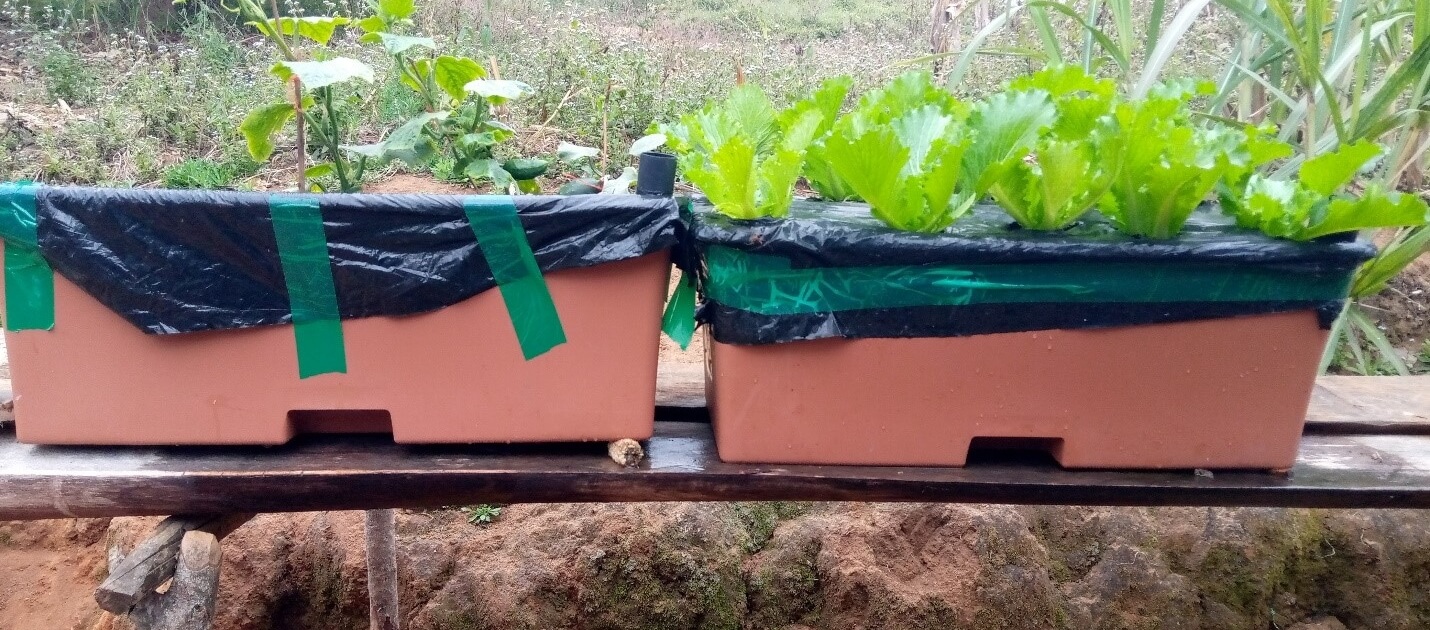
What have been your favorite parts of workshops and home visits?
Workshops are just great. I learned so much. They help us understand the things that we were not aware of and are very important for us to know. The benefits that other people were getting from the program and hearing about what they had learned are what made me decide to join the program. I believe that I will continue learning and benefitting more from the program for my child. Home visits are also great because since I joined the program, I have been learning a lot from the caregiver. I feel blessed when someone visits me.
“Workshops are just great. I learned so much. Home visits are also great because since I joined the program, I have been learning a lot from the caregiver. I feel blessed when someone visits me.”
– Emola Mbata, RCP mom
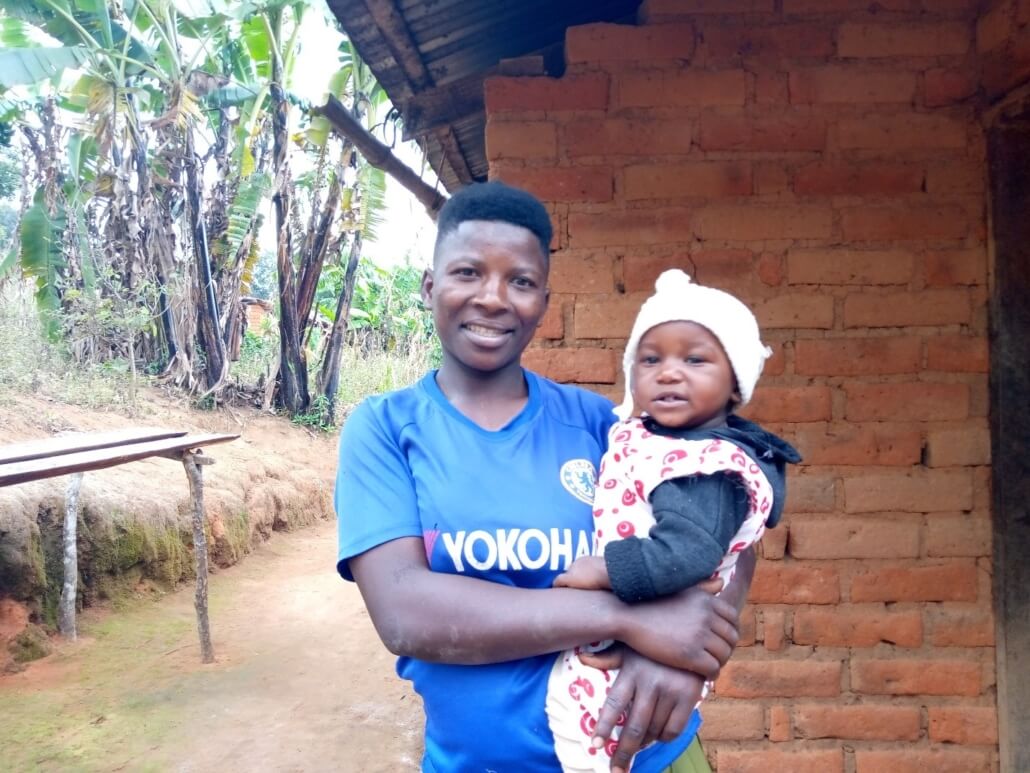
If you have been using the clinic services in Ipalamwa, how are they different from medical service available before the clinic opened?
The services at the Ipalamwa General Clinic are great because they are very systematic and very well organized. All staff there are professional and welcoming. And I feel like any medicine that I will get from that clinic will be helpful to heal the disease because the diagnosis is given before the prescription. Also, I’m grateful that we are treated for free so I can direct the funds I have to other activities and not to the hospital when my child or I get sick.

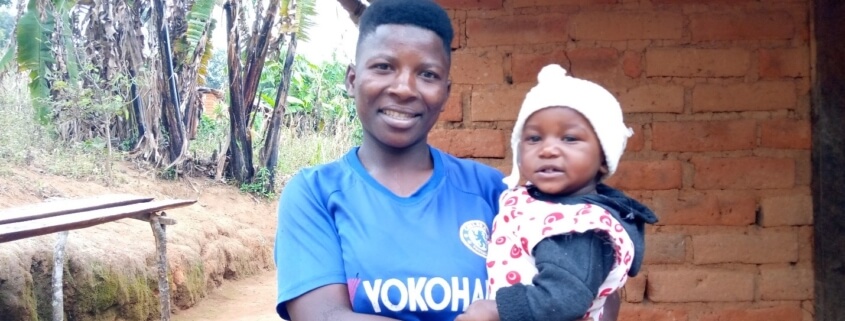
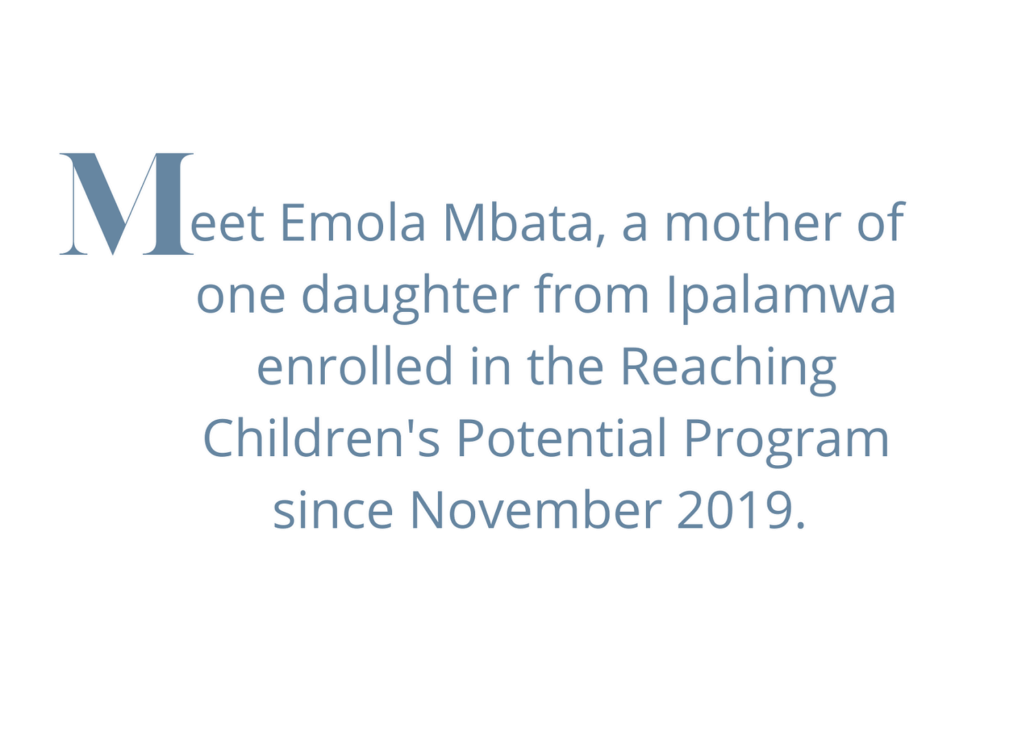
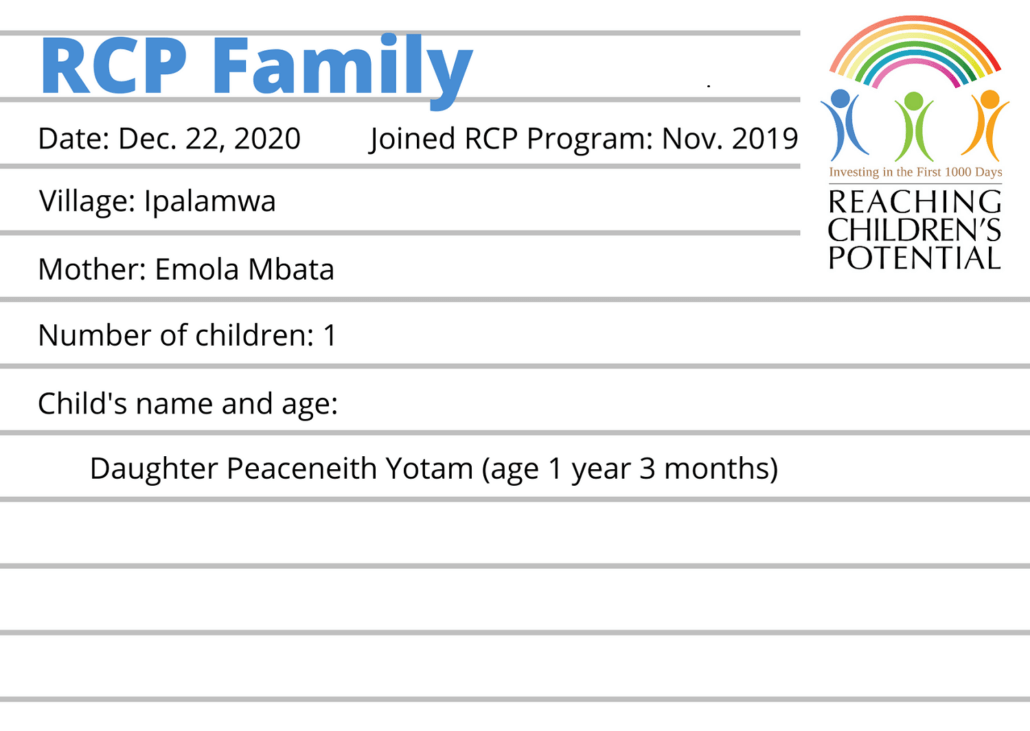


Leave a Reply
Want to join the discussion?Feel free to contribute!